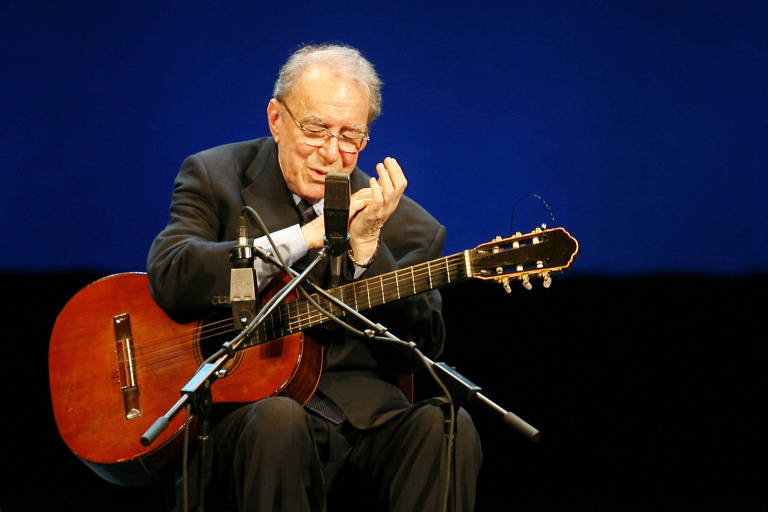João Gilberto's "Chega de Saudade"--recorded in Rio on July 10, 1958, and published without fanfare or expectation two months later--was 1 minute 59 seconds long. But the impact of this song by Antonio Carlos Jobim and Vinicius de Moraes belied its length—it divided the history of Brazilian culture into before and after. In the same space of time, João Gilberto, singer, and guitarist from Bahia, 27, became the center of attention in Brazil.
In a country of precarious communications, that 78 rpm record changed hearts and minds, for or against, wherever it was played. Joao Gilberto's dry and unadorned song was not exactly new, but, coupled with the guitar that produced a contagious and unexpected rhythm—soon to be called Bossa Nova—the harmonic complexity of Jobim and the relaxed sophistication of Vinicius's lyrics, it resulted in a musical revolution.
Months later, still in 1958, a new 78 rpm of João Gilberto, containing the samba "Desafinado" by Jobim and Newton Mendonça, consolidated the revolution. There was new music in the air, and Joao Gilberto was its interpreter. Other tracks by new and old composers were recorded in the following months, forming the 1959 LP "Chega de Saudade," which is for bossa nova what the letter of Pero Vaz de Caminha is to Brazil.
The release of these albums (and the following two LPs, "Love, Smile and Flower" in 1960 and "Joao Gilberto" in 1961) sparked a wave of semiprofessional shows at universities, aroused the massive interest of boys and girls in the guitar, revealed countless vocal vocations and seemed to make all the music created in Brazil until then "old." Suddenly bossa nova was a "movement"— a new style, a new song, something that a whole generation had only dreamed of.
And it was spontaneous. Bossa nova did not rely on television, still incipient in the country. It faced the resistance of the radio stations, then powerful and directed to more popular tastes—but even they had to surrender. The press, the publicity, the behavior, everything suddenly became "bossa nova."
Joao Gilberto, young composers like Carlos Lyra, Roberto Menescal, Baden Powell and Marcos Valle; lyricists like Ronaldo Bôscoli; singers like Alayde Costa, Claudette Soares, Leny Andrade, Pery Ribeiro, Wilson Simonal, Nara Leão and Wanda Sá; musicians like the arrangers Moacir Santos and Eumir Deodato; pianists Luiz Eça, Luiz Carlos Vinhas and Sergio Mendes; bassists Bebeto Castilho and Tião Neto; drummers Milton Banana and Edison Machado, and many, many others, revealed themselves.
It was a whole generation that created a kind of permanent summer in Brazilian music. The great artists who had prepared the ground for the Bossa Nova, such as Sylvia Telles, Dick Farney, Lucio Alves, Doris Monteiro, Miltinho, Luiz Bonfa, Johnny Alf, João Donato, Billy Blanco, Dolores Duran, Maysa, Tito Madi, and Os Cariocas, were not immune. Some naturally integrated into the movement; the public unfairly condemned others. But, sooner or later, everyone had their avant-gardism recognized. The arrival of Joao Gilberto shook everything out of place.
This also happened internationally. His discovery by international musicians and singers guaranteed him a cult following that, beginning in 1962, never stopped. The 1964 "Getz / Gilberto" LP is still the best-selling jazz album in history - which is surprising because it is actually a bossa nova record and sung in Portuguese! From Peggy Lee and Doris Day, in those days, Diana Krall and Stacey Kent, to Frank Sinatra, there was not a great artist, vocal or instrumental, who was not influenced by his "blend" of voice and guitar. Joao Gilberto would have become a billionaire if he had earned $ 0,01 every time someone emulated his style.
In Brazil, on the contrary, we dedicated ourselves to criticizing him for failing to compromise poorly, for not wanting air-conditioning to protect his guitar, for asking the audience to let him sing softly. And for staying true to a style and repertoire that took years to build and that he rightly did not want to squander. We forget that whenever Joao Gilberto left his hermitage on the 30th floor of an apart-hotel in Rio, it was because someone took him from there—agents, businessmen, record companies.
While we criticized him for missing the shows, we stopped listening to his legacy, highlighted in 13 studio albums and four live albums. It's all there—the man behind those wonders did not even need to appear in person.
Just as he created the bossa nova guitar beat playing alone in his sister's bathroom in Diamantina, Minas Gerais, in 1956, Joao Gilberto spent the last few decades playing for the walls of his apartment, delivered a mission, a crazy and impossible mission—perfecting perfection.
Translated by Kiratiana Freelon
